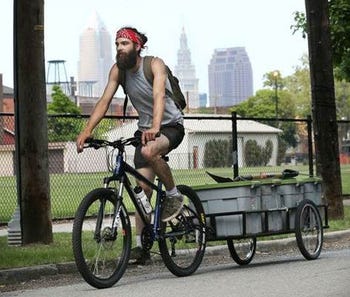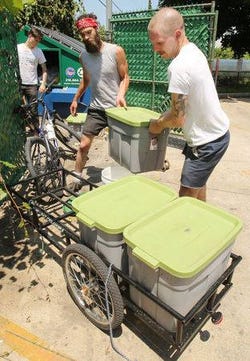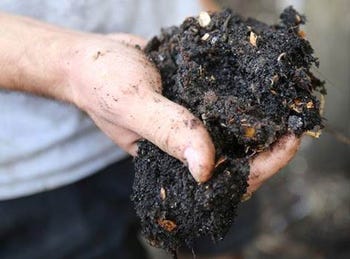There’s a steadily growing business in the city of Cleveland: a sustainable, worker-owned waste hauler that’s literally on the move.
On any given day, the four founders of Rust Belt Riders Composting are out collecting food scraps from area schools, restaurants and homes on the city’s West side. And they’re doing it all by bikes custom-fit with trailers for hauling the waste to community gardens for composting.
Their business was born of necessity, says Rust Belt Riders co-founder Daniel Brown. For years the group of friends had a community garden in Cleveland. Though a “healthy network” of community gardens exist there,” he says, “unfortunately, the soil is poor quality because the parcels previously were occupied by homes or other buildings. The friends were spending a lot of money shipping in soil amendment.
“We realized we could save ourselves a lot of time and energy by starting to compost on-site and grow our own soil,” Brown says. “Simultaneously, we were all working at restaurants, and we saw how much food waste was going out the back door. So we started taking it and bringing it to our garden.”

Photo: John Kuntz
Having discovered a market for organic waste collection, they started charging to haul restaurant food waste for composting to local community gardens.
As word has spread, so has the customer base.
Brown says since June 2014, the worker-owned co-op has collected more than 50,000 pounds of food scraps servicing 50 restaurants, schools and residences.
But word is getting louder as recently the company took home a $20,000 grant from SEA Change of Northeast Ohio—SEA is for Social Enterprise Accelerator—where Rust Belt Riders and other entrepreneurs spent five months of social impact and business viability training, received one-on-one mentoring and hours of practice time building their business pitch.
Brown and the others publicly pitched their ideas in hopes of splitting $50,000 in grant money, of which Rust Belt Riders took the lion’s share. Brown says they weren’t exactly expecting to walk away with $20,000, but the “holistic approach to community wealth building simply by looking at what other people see as waste and seeing it as a value-added commodity” may have tipped the scales.
Rust Belt Riders’ first client Chef Ben Bebenroth, owner of Spice Kitchen and Bar on Detroit Ave. in Cleveland says he’s not surprised the co-op was awarded the grant.
“I think it’s a great use of funds. They definitely need it. Because a lot of the ways they’re operating right now is very boot-strapsy and slightly primitive, and that’s great because it’s a good test of might of an entrepreneur in that first phase,” Bebenroth says. “You know everybody who makes it as an entrepreneur has to really kick out the jams in the beginning. And it’s real tough. And nothing works. And you’re totally underfunded. And that’s the test, you know. That’s like the crucible of whether or not what you’re doing is worth it.”
Brown says the grant money will go a long way in streamlining billing and managing customer relations.

Photo: John Kuntz
“In addition to that,” he says. “We’re going to need more bikes and trailers because we’ve been fielding a lot of calls these past few days with regard to inquiries of services. I think we are going to be growing pretty rapidly here.”
In fact, this summer, the company is launching a pilot program in Cleveland’s Third Ward that should add 50 to 150 city residents to its growing list of clients. If successful, the pilot, which he says is modeled after the city of Boston’s food waste conversion program, could lay the groundwork for possible business and tax incentives for those diverting organics from the waste stream. Rust Belt Riders, he adds, could triple its first year’s numbers.
Waste360 grabbed a few minutes with Brown to dive deeper on the inner workings of Rust Belt Riders Composting.
Waste360: Why do your pickups by bike?
Daniel Brown: In large part because that’s how we were getting around the city already. We thought it would be a nice way to see the city and to make visual what is otherwise sort of a behind-the-scenes process. You put your garbage out on the tree lawn and it disappears. We thought it was important that people see where their garbage was going. It created a lot of conversation about “What are you doing with that bike?” and “What do you have in that trailer?” that actually garnered a lot of interest from passersby and other businesses.
What we thought was sort of a kitschy idea has turned out to be a cost-savings measure. We’re able to move more on our trailers per hour than we are in a truck. We’ve found that getting in and out of a garden is difficult and if you just have a car. You have to find parking and you have to carry it. Our trailers serve the dual purpose of garden cart and once you get to the garden you can just roll it right over to the compost pile. You couldn’t necessarily do that with a truck.
Waste360: Like your mode of transportation, Rust Belt Riders has a unique business model. Can you explain how it works?
Daniel Brown: We work with about 10 community gardens and all the composting currently takes place at these gardens. The excess compost produced that the gardens can’t use, we will be selling at farmer’s markets this summer.
The idea is—to add another wrinkle—we’re a worker cooperative. We think our members should inform how we carry out our service. We want people to feel ownership about the way they divert and the compost that we create and feel free to use that. We call our customers “members” because they know as much about this business as we do. So we are trying to learn from them and making sure we’re meeting their needs rather than claiming that we know exactly what we’re doing.

Photo: John Kuntz
Right now, we offer two types of service—residential and commercial. Commercial clients schools, coffee shops, business, restaurants—are charged by the pound. Residential clients pay a flat $5 fee per pickup. We provide all of our resident subscribers with a 5-gallon bucket that we encourage them to keep in their kitchen or on their porch. Every time we pick up, we leave a clean bucket and take the one with food scraps. All customers are provided with a cheat sheet on do’s and don’ts of composting and what we accept. For instance, we don’t take meat or dairy, but we do accept egg shells.
Waste360: Rust Belt Riders did its first pickup on June 1, 2014 and you’ve cultivated quite a following already. Tell us about your growth since then.
Daniel Brown: It’s been growing at a pretty fast clip which is nice and a little bit nerve wracking. Now we have anywhere from 45 to 50 members in a handful of Cleveland neighborhoods, including the Detroit-Shoreway where we initially formed partnerships, Ohio City, Tremont, Brooklyn Center, Downtown proper, St. Clair-Superior and Midtown. We are slowly growing out to University Circle, Shaker Square and Lakewood.
Waste360: Rust Belt Riders recently was awarded $20,000 worth of investment during a pitch event for graduates of Cleveland’s SEA Change social enterprises accelerator. Tell us about being a part of SEA Change.
Daniel Brown: SEA Change was an opportunity we jumped at because we don’t fall into the traditional landscape of a startup—we’re not high-tech or high-growth. Finding an incubator that would allow us to take a deep look at what we were doing and make tweaks and learn from experts who have sort of gone before us was really, really a tremendous opportunity and one that we knew we had to take advantage of.
We very easily could operate as a nonprofit and apply for grants constantly and continue to win those grants because what we’re doing is sort of trendy. But we thought that it was important to run our business as a for-profit venture. SEA Change emerged as the only funding and support opportunity for a company that wanted to do good in society and create wealth.
We went through six months of classes and coaching and practicing our pitch and working on our business plan—all while meeting small business leaders from across the region. It was absolutely fantastic.
Waste360: Do you hope to have your own composting facility one day?
Daniel Brown: We are starting to think about what that is going to look like—acquiring property so that we can do processing ourselves. With that comes a lot of associated investment, and we would have to apply for loans so we’re all having to flex our business muscles in a much more concerted way.
Waste360: Do you bike all year-round, even in snowy and inclement weather?
Daniel Brown: We bike whenever it makes sense. Actually this past winter I took a pretty hefty spill, got a concussion, spent the night in the hospital and had a hairline fracture on my elbow. That was sort of wakeup call.
Waste 360: How many miles do you log on your bikes every week?
Daniel Brown: That’s a good question. We haven’t been keeping track of our total miles but we have been keeping track of our total waste diversion. We’re at about 52,000 to 53,000 pounds since June 1.
Waste360: How close are you to making a profit?
Daniel Brown: Right now it’s a very narrow and nimble operation with four people—me and three others (including co-founder Michael Robinson) doing the work. We plan to add two or three more riders. Over the next two months, we’ll finally be paying our riders. Everyone to date has been sort of doing it as a passion project because we see the value in what it provides to our community. From there I think the profit will begin to slowly flow in and hopefully we can slowly start backing out of our odds-and-ends jobs to do this in a more full-time capacity.
Waste360: What makes what you do so fun?
Daniel Brown: The people who we get to interact with on a daily basis. It’s really inspiring. In my mind, the gardeners, chefs and home cooks of Cleveland are just some of the coolest people to spend time with. They are just people who look at food and see it for the gem and value that it actually has. It takes someone with a real green thumb to really appreciate a ripe tomato when it’s in season. And our members who are composting understand that there is value in responsibly diverting your food waste.
Waste360: What’s next on the map for Rust Belt Riders?
Daniel Brown: We are in conversations with a Cleveland City Councilman about starting a pilot program in his ward and we are even working on legislation that would sort of incentivize businesses to begin composting. All of this is just a tremendous testament to the hard work that everyone on our team has put in and the support that the community has shown us.
About the Author(s)
You May Also Like


